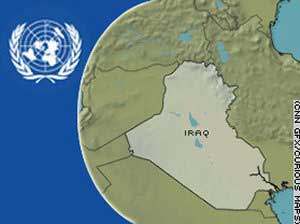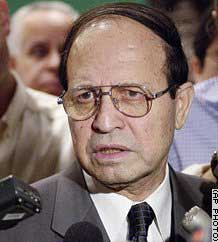
Workers at a manufacturing plant outside of Baghdad. The facility has been singled out as one that might be part of Iraqi efforts to build weapons of mass destruction |
UNITED NATIONS --
The United States and Britain expressed skepticism Wednesday after Baghdad
accepted a U.N. resolution demanding that Iraq allow inspectors to resume
their search for weapons of mass destruction.
In New York, Iraq's ambassador to the United Nations, Mohammad Al-Douri, delivered a letter of acceptance to U.N. Secretary-General Kofi Annan, telling reporters that it said, "Iraq will not have any mass destruction weapons. So we are not worried about the inspectors when they will be back in the country. Iraq is clean." White House spokesman Scott McClellan said that the Bush administration had not seen the letter -- but warned that if it contained "any false information or omissions, that would be considered a violation," of the resolution. |
